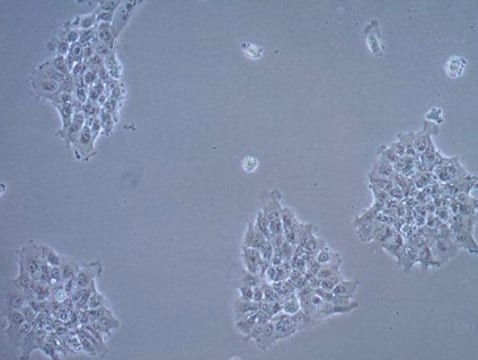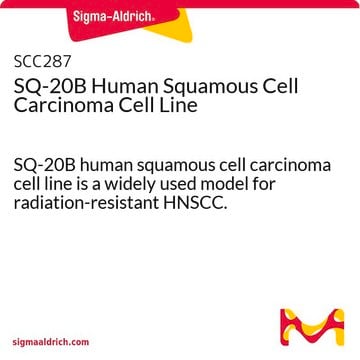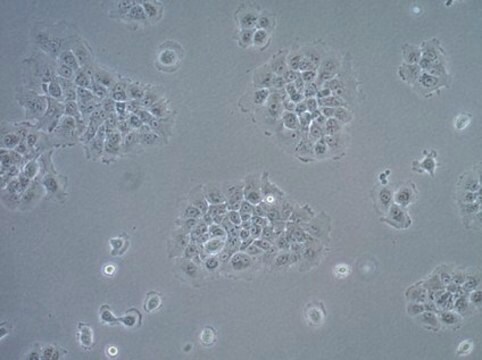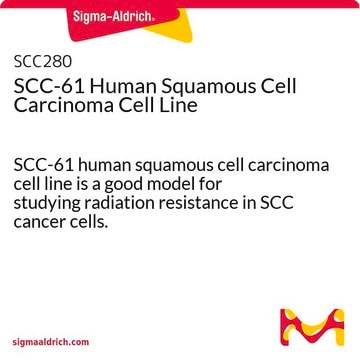推荐产品
product name
UM-SCC-47 HPV-16 Positive Squamous Carcinoma Cell Line, suitable in vitro model of H&N carcinoma studies
生物源
human
品質等級
技術
cell culture | mammalian: suitable
運輸包裝
liquid nitrogen
一般說明
All UM-SCC cell lines were derived in the lab of Dr. Thomas Carey at the University of Michigan and are exclusively distributed by Merck KGaA, Darmstadt, Germany. Access to UM-SCC cells is limited solely to those officers, employees and students of PURCHASER’s institution who need access to perform research. PURCHASER may not distribute UM-SCC cells or derivatives to third parties. PURCHASER shall comply with all applicable laws in its use and handling of the Product and shall keep it under reasonable safe and secure conditions to prevent unauthorized use or access.
THIS PRODUCT IS ONLY AVAILABLE FOR SALE TO ACADEMIC INSTITUTIONS OR NOT-FOR-PROFIT ENTITIES FOR USE UNDER THIS LIMITED USE LABEL LICENSE. FOR INFORMATION ON COMMERCIAL LICENSING OF UM-SCC CELLS, INCLUDING LICENSING TO COMMERCIAL ENTITIES, PLEASE CONTACT: licensing@emdmillipore.com
Head and neck squamous-cell carcinoma (HNSCC) is the 6th most common type of cancer world-wide. The cancer may occur in the lip, oral cavity, nasal cavity, paranasal sinuses, salivary glands, pharynx and larynx. Risk factors include smoking, alcohol consumption, betel nut chewing, wood dust exposures and human papilloma virus (HPV) infections. Approximately 15% of HNSCC contain genomic DNA from HPV. In particular, HPV-16 occurs in 90-95% of all HPV-positive HNSCC cases. In oral and pharynx cancer, HPV DNA is found in the tonsils in 45-67% of the cases. HPV DNA is found in 13-25% of the cases in the hypopharynx, 12-18% in the oral cavity and 3-7% in the larynx.
UM-SCC-47 is a unique head and neck squamous carcinoma cell line isolated from the primary tumor of the lateral tongue of a male patient. The cell line contains 18 copies of integrated HPV-16.
UM-SCC-47 was established at the University of Michigan with written informed consent obtained from the patient and with the approval of the study by the Medical School Institutional Review Board.
Reference:
1) Carey, T., et al. (2012) Genotyping of 73 UM-SCC head and neck squamous cell carcinoma cell lines. Head Neck. 2010 April; 32(4): 417–426.
THIS PRODUCT IS ONLY AVAILABLE FOR SALE TO ACADEMIC INSTITUTIONS OR NOT-FOR-PROFIT ENTITIES FOR USE UNDER THIS LIMITED USE LABEL LICENSE. FOR INFORMATION ON COMMERCIAL LICENSING OF UM-SCC CELLS, INCLUDING LICENSING TO COMMERCIAL ENTITIES, PLEASE CONTACT: licensing@emdmillipore.com
Head and neck squamous-cell carcinoma (HNSCC) is the 6th most common type of cancer world-wide. The cancer may occur in the lip, oral cavity, nasal cavity, paranasal sinuses, salivary glands, pharynx and larynx. Risk factors include smoking, alcohol consumption, betel nut chewing, wood dust exposures and human papilloma virus (HPV) infections. Approximately 15% of HNSCC contain genomic DNA from HPV. In particular, HPV-16 occurs in 90-95% of all HPV-positive HNSCC cases. In oral and pharynx cancer, HPV DNA is found in the tonsils in 45-67% of the cases. HPV DNA is found in 13-25% of the cases in the hypopharynx, 12-18% in the oral cavity and 3-7% in the larynx.
UM-SCC-47 is a unique head and neck squamous carcinoma cell line isolated from the primary tumor of the lateral tongue of a male patient. The cell line contains 18 copies of integrated HPV-16.
UM-SCC-47 was established at the University of Michigan with written informed consent obtained from the patient and with the approval of the study by the Medical School Institutional Review Board.
Reference:
1) Carey, T., et al. (2012) Genotyping of 73 UM-SCC head and neck squamous cell carcinoma cell lines. Head Neck. 2010 April; 32(4): 417–426.
細胞系描述
Cancer Cells
應用
Research Category
Infectious Diseases
Inflammation & Immunology
Apoptosis & Cancer
Infectious Diseases
Inflammation & Immunology
Apoptosis & Cancer
This product is available for sale to academic institutions or not-for-profit entities for research use. For information on commercial licensing please contact licensing@emdmillipore.com.
成分
1) ≥1X106 viable UM-SCC-47 Squamous Carcinoma Cells: (Catalog No. SCC071). Store in liquid nitrogen.
品質
• Each vial contains ≥ 1X10^6 viable cells.
• Cells are tested by PCR and are positive for HPV-16 and negative for Hepatitis A, B, C and HIV-1 & 2 viruses.
• Cells are negative for mycoplasma contamination.
• Each lot of cells are genotyped by STR analysis to verify the unique identity of the cell line.
• Cells are tested by PCR and are positive for HPV-16 and negative for Hepatitis A, B, C and HIV-1 & 2 viruses.
• Cells are negative for mycoplasma contamination.
• Each lot of cells are genotyped by STR analysis to verify the unique identity of the cell line.
儲存和穩定性
UM-SCC-47 cells should be stored in liquid nitrogen. The cells can be cultured for at least 10 passages after initial thawing without significantly affecting the cell marker expression and functionality.
免責聲明
Unless otherwise stated in our catalog or other company documentation accompanying the product(s), our products are intended for research use only and are not to be used for any other purpose, which includes but is not limited to, unauthorized commercial uses, in vitro diagnostic uses, ex vivo or in vivo therapeutic uses or any type of consumption or application to humans or animals.
RESEARCH USE ONLY. This product is regulated in France when intended to be used for scientific purposes, including for import and export activities (Article L 1211-1 paragraph 2 of the Public Health Code). The purchaser (i.e. enduser) is required to obtain an import authorization from the France Ministry of Research referred in the Article L1245-5-1 II. of Public Health Code. By ordering this product, you are confirming that you have obtained the proper import authorization.
儲存類別代碼
6.2 - Infectious substances
水污染物質分類(WGK)
WGK 1
閃點(°F)
Not applicable
閃點(°C)
Not applicable
Julia E Myers et al.
Current protocols in microbiology, 59(1), e119-e119 (2020-10-17)
Integration of the human papillomavirus (HPV) genome into host cell chromosomes has been observed in a majority of HPV-positive cervical cancers and a subset of oral HPV-associated cancers. HPV integration also occurs in long-term cell culture. Screening for HPV integration
Yuanhui Liu et al.
Nature communications, 13(1), 7047-7047 (2022-11-18)
Chemotherapy can eradicate a majority of cancer cells. However, a small population of tumor cells often survives drug treatments through genetic and/or non-genetic mechanisms, leading to tumor recurrence. Here we report a reversible chemoresistance phenotype regulated by the mTOR pathway.
Katarzyna Zwolinska et al.
Journal of virology, 97(6), e0021423-e0021423 (2023-05-24)
Even though replication and transcription of human papillomavirus type 16 (HPV16) has been intensively studied, little is known about immediate-early events of the viral life cycle due to the lack of an efficient infection model allowing genetic dissection of viral
Christian T Fontan et al.
mSphere, 5(6) (2020-12-11)
Human papillomaviruses (HPVs) are causative agents in around 5% of all cancers, including cervical and oropharyngeal. A feature of HPV cancers is their better clinical outcome compared with non-HPV anatomical counterparts. In turn, the presence of E2 predicts a better
Malgorzata Bienkowska-Haba et al.
Journal of virology, 97(2), e0187922-e0187922 (2023-02-08)
The current model of human papillomavirus (HPV) replication is comprised of three modes of replication. Following infectious delivery, the viral genome is amplified during the establishment phase to reach up to some hundred copies per cell. The HPV genome copy
商品
AldeRed™ 588-A detects ALDH activity in cancer stem cells, aiding in cancer research.
AldeRed™ 588-A detects ALDH activity in cancer stem cells, aiding in cancer research.
AldeRed™ 588-A detects ALDH activity in cancer stem cells, aiding in cancer research.
AldeRed™ 588-A detects ALDH activity in cancer stem cells, aiding in cancer research.
我们的科学家团队拥有各种研究领域经验,包括生命科学、材料科学、化学合成、色谱、分析及许多其他领域.
联系技术服务部门








